5 start with W start with W
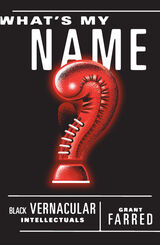
Whom does society consider an intellectual and on what grounds? Antonio Gramsci’s democratic vision of intelligence famously suggested that “all men are intellectuals,” yet within academic circles and among the general public, intellectuals continue to be defined by narrow, elite criteria.
In this study of four celebrated citizens of the African diaspora—American boxer Muhammad Ali, West Indian Marxist critic C. L. R. James, British cultural theorist Stuart Hall, and Jamaican musician Bob Marley—Grant Farred develops a new category of engaged thinker: the vernacular intellectual. Extending Gramsci’s concept of the organic intellectual, Farred conceives of vernacular intellectuals as individuals who challenge social injustice from inside and outside traditional academic or political spheres. Muhammad Ali, for example, is celebrated as much for his dazzling verbal skills and courageous political stands as for his pugilistic talents; Bob Marley’s messages of liberation are as central to his popularity as his lyrical and melodic sophistication. Neither man is described as an intellectual, yet both perform crucial intellectual functions: shaping how people see the world, oppose hegemony, and understand their own history. In contrast, the careers of C. L. R. James and Stuart Hall reflect a dynamic blend of the traditional and the vernacular. Conventionally trained and situated, James and Hall examine racism, history, and the lasting impact of colonialism in ways that draw on both established scholarship and more popular cultural experiences.
Challenging existing paradigms, What’s My Name offers an expansive and inclusive vision of intellectual activity that is as valid and meaningful in the boxing ring, the press conference, and the concert hall as in academia.
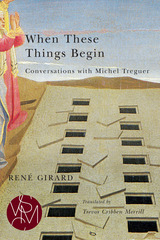
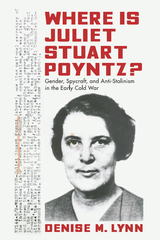
In Where Is Juliet Stuart Poyntz?, Denise M. Lynn argues that Poyntz's sudden disappearance was the final straw for many on the American political left, who then abandoned Marxism and began to embrace anti-communism. In the years to follow, the left crafted narratives of her disappearance that became central to the Cold War. While scholars have thoroughly analyzed the influence of the political right in the anti-communism of this era, this captivating and compelling study is unique in exploring the influence of the political left.
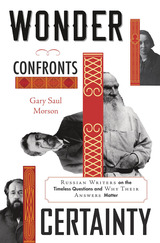
A noted literary scholar traverses the Russian canon, exploring how realists, idealists, and revolutionaries debated good and evil, moral responsibility, and freedom.
Since the age of Tolstoy, Dostoevsky, and Chekhov, Russian literature has posed questions about good and evil, moral responsibility, and human freedom with a clarity and intensity found nowhere else. In this wide-ranging meditation, Gary Saul Morson delineates intellectual debates that have coursed through two centuries of Russian writing, as the greatest thinkers of the empire and then the Soviet Union enchanted readers with their idealism, philosophical insight, and revolutionary fervor.
Morson describes the Russian literary tradition as an argument between a radical intelligentsia that uncompromisingly followed ideology down the paths of revolution and violence, and writers who probed ever more deeply into the human condition. The debate concerned what Russians called “the accursed questions”: If there is no God, are good and evil merely human constructs? Should we look for life’s essence in ordinary or extreme conditions? Are individual minds best understood in terms of an overarching theory or, as Tolstoy thought, by tracing the “tiny alternations of consciousness”? Exploring apologia for bloodshed, Morson adapts Mikhail Bakhtin’s concept of the non-alibi—the idea that one cannot escape or displace responsibility for one’s actions. And, throughout, Morson isolates a characteristic theme of Russian culture: how the aspiration to relieve profound suffering can lead to either heartfelt empathy or bloodthirsty tyranny.
What emerges is a contest between unyielding dogmatism and open-minded dialogue, between heady certainty and a humble sense of wonder at the world’s elusive complexity—a thought-provoking journey into inescapable questions.
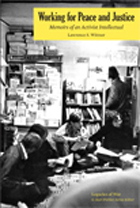
A longtime agitator against war and social injustice, Lawrence Wittner has been tear-gassed, threatened by police with drawn guns, charged by soldiers with fixed bayonets, spied upon by the U.S. government, arrested, and purged from his job for political -reasons. To say that this teacher-historian-activist has led an interesting life is a considerable understatement.
In this absorbing memoir, Wittner traces the dramatic course of a life and career that took him from a Brooklyn boyhood in the 1940s and ’50s to an education at Columbia University and the University of Wisconsin to the front lines of peace activism, the fight for racial equality, and the struggles of the labor movement. He details his family background, which included the bloody anti-Semitic pogroms of late-nineteenth-century Eastern Europe, and chronicles his long teaching career, which comprised positions at a small black college in Virginia, an elite women’s liberal arts college north of New York City, and finally a permanent home at the Albany campus of the State University of New York. Throughout, he packs the narrative with colorful vignettes describing such activities as fighting racism in Louisiana and Mississippi during the early 1960s, collaborating with peace-oriented intellectuals in Gorbachev’s Soviet Union, and leading thousands of antinuclear demonstrators through the streets of Hiroshima. As the book also reveals, Wittner’s work as an activist was matched by scholarly achievements that made him one of the world’s foremost authorities on the history of the peace and nuclear disarmament movements—a research specialty that led to revealing encounters with such diverse figures as Norman Thomas, the Unabomber, Zbigniew Brzezinski, Caspar Weinberger, and David Horowitz.
A tenured professor and renowned author who has nevertheless lived in tension with the broader currents of his society, Lawrence Wittner tells an engaging personal story that includes some of the most turbulent and significant events of recent history.
Lawrence S. Wittner, emeritus professor of history at the University at Albany, SUNY, is the author of numerous scholarly works, including the award-winning three-volume Struggle Against the Bomb. Among other awards and honors, he has received major grants or fellowships from the National Endowment for the Humanities, the American Council of Learned Societies, the Aspen Institute, the United States Institute of Peace, and the John D. and Catherine T. MacArthur Foundation.
READERS
Browse our collection.
PUBLISHERS
See BiblioVault's publisher services.
STUDENT SERVICES
Files for college accessibility offices.
UChicago Accessibility Resources
home | accessibility | search | about | contact us
BiblioVault ® 2001 - 2024
The University of Chicago Press









